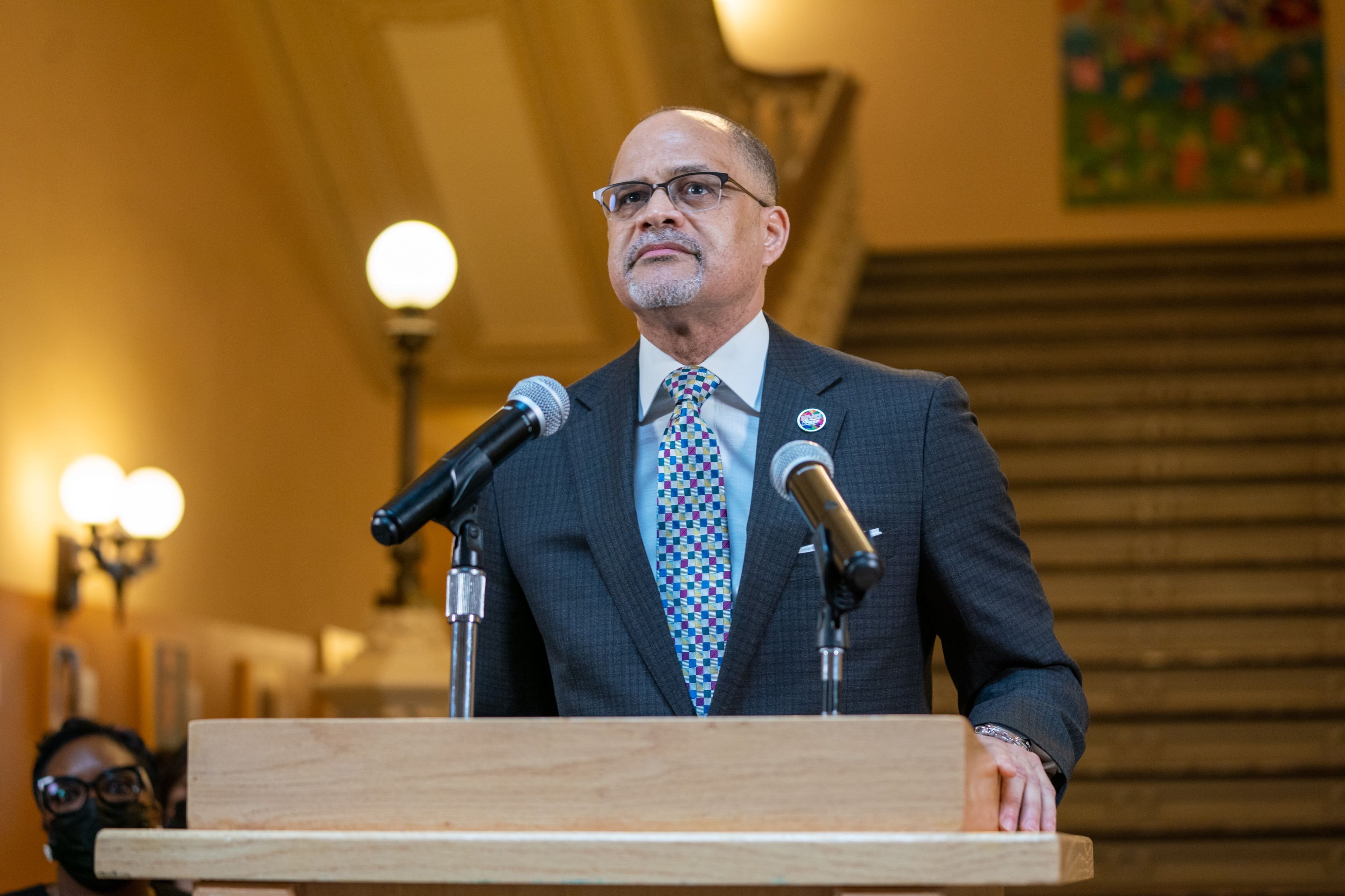Facing fierce pushback after Chancellor David Banks said the city is spending too much money on private schools for students with disabilities, top education officials walked those comments back during a Wednesday City Council hearing.
“I can assure you that the chancellor’s comments were not meant in the way that they were presented and he has apologized in many forums about that,” Christina Foti, the department’s special education chief, said during a City Council oversight hearing after multiple lawmakers raised the issue.
Last month, Banks told parent leaders that “folks have figured out how to game this system,” referring to private school payments that have ballooned to over $1 billion in recent years. He suggested the city could avoid budget cuts if more of that money was redirected to public schools.
“We’d be able to pay for all that after-school programming, all of those kinds of things. This is money that’s going out the back door every single day,” Banks said.
Those statements sparked intense and swift pushback from parents, advocates, and some lawmakers, who pointed out that students with disabilities have a legal right to a private placement if the city is unable to serve them appropriately in a public school. It’s also not clear that the city would save money by serving those students in public schools without reducing services.
Banks’ comments, first reported by Chalkbeat, prompted multiple City Council members to grill officials about the department’s plans on Wednesday. And it also sparked an unusual series of clarifications from senior education officials, including the department’s top lawyer, its special education chief, and a deputy chancellor who oversees instruction. Banks did not attend Wednesday’s hearing.
“Parents are not gaming the system — the system is broken,” Rita Joseph, who chairs City Council’s education committee, said during the hearing. “My office has been contacted by advocates [and] parents who are both outraged and stressed by the chancellor’s suggestion of slashing this vital source of funding for students with disabilities.”
Education officials said that contrary to Banks’ comments, they are not seeking to directly cut private school tuition dollars but hope to build public programs that are better able to serve students with disabilities.
Carolyne Quintana, the deputy chancellor for teaching and learning, said the department doesn’t “seek to limit payments.” Instead, “we’re looking for ways to provide families with what they need upfront,” she added, “so that fewer have to file such cases and to ensure that those cases that do proceed to a hearing reach consistent reasonable outcomes and comply with the law.”
Private school tuition payments for students with disabilities have long stirred debate. Some parents see the system as essential to ensuring their children are receiving adequate services that are often unavailable in traditional public schools, ranging from support for students with relatively mild issues, such as dyslexia, to more significant intellectual delays.
But securing tuition reimbursements can be a time-consuming process that favors families with time, money, or help from pro-bono lawyers — and some argue the money sent to private schools should instead be devoted to building public programs that are more accessible to all families.
Some students are placed directly in private schools by the education department in cases where the city agrees that the student can’t be properly served in a public program. Placements in those state-approved programs cost roughly $400 million last year, said Liz Vladeck, the education department’s general counsel.
Other families must sue the city to win tuition payments, often referred to as Carter cases, which cost $800 million last year, though Vladeck said that figure would likely grow as their accounting of last year’s spending is not complete. (It also includes payments for private special education services other than tuition.)
Vladeck also noted that the number of special education due process complaints, in which parents claim that their child is not receiving appropriate services, ballooned to over 18,000, a more than fourfold increase over the last 10 years. The system that handles those complaints has struggled with backlogs, though city officials are in the process of shifting that system’s oversight.
Still, education department officials maintained that even if most families are approaching the tuition reimbursement process in good faith, others are not. Vladeck said there are some “attorneys or consultants” who conduct “particularized evaluations” and then steer families to programs that they operate and charge upwards of $200,000 per student.
A spokesperson for the education department did not immediately provide evidence of that claim nor did he answer a question about whether the city is contesting the students’ placements in those cases.
“I know that the chancellor is deeply committed to ensuring that every dollar goes to children, not to help someone build their business,” Vladeck said, “and I think that’s what [Banks’] comment was speaking to.”
Maggie Moroff, a special education policy expert at Advocates for Children, said it would be “significant” if the city could serve more students with disabilities in traditional public schools and she appreciates “the DOE working to explain and think through [Banks’] comments.”
“Our concern remains that all students with disabilities can get the supports they need here in New York City,” Moroff wrote, “and if that can’t happen in the public schools, it has to happen outside of them.”
Alex Zimmerman is a reporter for Chalkbeat New York, covering NYC public schools. Contact Alex at azimmerman@chalkbeat.org.






